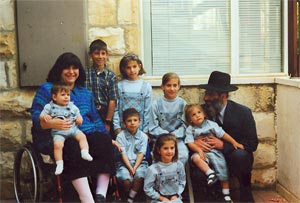 Vampire Weekend's Surprising Jewish Stories
Vampire Weekend's Surprising Jewish Stories


8 min read
When tragedy hits our lives, do we stop living?
This past Shabbat, with my husband away in England for work, I had a friend come over and stay for three days with her three children because her husband was away in New York for work. Another friend of ours who had a baby not long ago wanted to "get away," so she too came and stayed for Shabbat with her husband and two children. In addition, I had a young woman who stayed with us to help with the children, another young woman who recently gave birth with her new baby, my mother-in-law, and my own seven children.
It was quite a houseful, with four babies all under seven months old, two toddlers, and three more under age five. Just the logistics of who would sleep where and with whom, who would sit where at the table, and who needed a bottle, nursing or a diaper change might have been enough to turn the heart of the bravest army general, however well-schooled in the art of combat control.
That was this week.
"What's the big deal? A few Shabbat guests? We do that and more every week."
Last week, I had a different friend come with two small children. She stayed for four days, while her husband took their older children on their yearly visit to their grandparents in Florida. Thursday morning, when I was just beginning to contemplate my Shabbat preparations, my downstairs neighbor came in. (His wife was in New York, visiting her ailing father).
"Michele, how do you cook a chicken?"
"Don't worry, Shmuel, just bring it to me and I don't mind cooking it for you. But you can't just make one chicken. You have eight children besides yourself that you'll need to feed."
"That's okay; we'll fill up on soup."
"Fine, bring me a chicken."
"Now I really don't have any ulterior motives, but can I just ask you one more question?"
"Sure, Shmuel, go ahead."
"How do you make soup?"
"Oh forget it. Just come for Friday night dinner. You'll have to bring me an extra table and some silverware, though, okay?"
We both laughed and I hope one of us walked away from that conversation somewhat relieved. So that Friday night, we were seven adults and 17 children. Somehow we even managed to squeeze in three high-chairs and an infant seat around the table.
My friends are always asking me: how do I do it? How do I manage? Some of you may be thinking, "Is she crazy? It's all I can do to get supper on the table for my family!" while others may be thinking, "What's the big deal? A few Shabbat guests? We do that and more every week." Each of us has her own strengths, and with them we choose the mitzvot that we are most likely to do comfortably.
So what is the big deal anyway? I am doing all of this cooking, preparing, planning, entertaining, and cleaning up while sitting in a wheelchair.
 Four years ago during the routine delivery of my fifth child, my doctor (with my consent) called for an anesthesiologist to administer an epidural anesthetic. The epidural caused bleeding into the spinal column, and because of the neglect of the doctor and hospital staff, I remain a paraplegic to this day.
Four years ago during the routine delivery of my fifth child, my doctor (with my consent) called for an anesthesiologist to administer an epidural anesthetic. The epidural caused bleeding into the spinal column, and because of the neglect of the doctor and hospital staff, I remain a paraplegic to this day.
I can't begin to write about the upheaval this caused in my family and my life. Instead of spending two days in the hospital followed by a few days in Beit HaHachlama (a mother-and-baby convalescent home) and then coming home in time for the bris, I spent three days lying in a hospital bed not knowing what had happened to me. Then I was whisked by ambulance in the middle of the night across Jerusalem to a second hospital for an operation that the surgeons warned me wouldn't help, because it was "already too late."
At the urging of my surgeon, I made it to the baby's bris. I arrived there in an ambulance looking surprisingly well, considering what I had gone through in that one week.
I didn't actually make it home to stay for almost six months, during which time I was in the rehab unit of Hadassah Hospital where I received physical therapy, occupational therapy, and scores of lessons in life from the nursing staff and fellow patients. It would be impossible to make an accounting of the hours I spent with my therapists, the social workers, the nurses, interior designers, and builders, as well as family, friends and fellow patients, discussing and planning how my life would unfold once I was again at home and with my family.
"The kitchen has to work for me. I do a lot of cooking and entertaining."
"The living room has to be open and spacious. We host a lot of Torah classes in the house and we like to have Shabbat guests."
"I'm still the Mommy, I have to be able to bathe my kids, feed them, and sit with them to do homework."
"We have to have a place for a crib. When we have more children, God willing, I'll have to have them near me."
"More children?!" The doctors and nurses, almost all Russian immigrants, were incredulous when my husband and I sat down with them almost immediately to ask how my condition would affect future pregnancies and births.
"More children?!" Even my interior designer, a close friend and the wife of a great Torah scholar, was shocked by the thought. "I couldn't take you seriously when you talked about more children," she told me recently. "But I didn't want to sound discouraging, so I went along with it. Now look at you, two more children and you're doing great!"
"Doing great." I actually hear that a lot. What does that mean?
"Doing great." I actually hear that a lot. I hear it from my friends, my husband, and people who knew me back then, in the beginning, when I run into them outdoors.
"Doing great." What does that mean? Does it mean that I am managing it all without any help? No, I actually have plenty of help: babysitters, and house-cleaners and an army of seminary girls who march in and out of my house for the two hours of chessed [kindness] they are required to do each week.
Does it mean that I never get upset or frustrated at my disability? No, there are many things that I find frustrating and upsetting: the fact that I miss more simchas [celebrations] than I attend because the halls are inaccessible or the elevator is not operating; the fact that I can rarely complete a task in the house without calling for help to reach something placed out of my reach or to pick up something I've dropped; the times I've been stuck in the bathroom because some member of my family left my bedroom door open, giving anyone in the hall a clear view of me exiting the bathroom straight from the shower; the times I've been stuck in my bed because I didn't have clothing to wear and no one was at home to help me out, or because the wheelchair had a broken axle or a flat tire; the times I've been left sitting in the chair in the street or parking lot, tears of frustration coursing down my cheeks because the building I was assured had wheelchair accessibility didn't; the times I've been left alone in the house, a baby happily playing on the floor, only to have him begin to wail the moment there was no one else there to pick him up.
I could go on and on, but there wouldn't be any point and that certainly isn't my point.
So what do my friends, family, husband and neighbors all mean when they shake their heads and say, "You're doing great"? I guess it could mean that I accept what the Almighty has given me with simcha, joy, knowing that in His infinite wisdom He has chosen this path for me.
I guess it could also mean that instead of wallowing in my changed circumstances I have chosen to go on with my life full speed ahead, having more children, Shabbat guests, chessed projects, and more.
It could mean that I've worked on myself throughout this test and came out of it a better person in some ways than I went in.
But I don't think about it this way. I don't sit and wonder whether I am doing great or not so great. I'm too busy living my life, raising my kids, cooking my meals, writing my stories, acting in plays, making my friends.
I'm not doing great, I'm just doing.
